| Listing 1 - 6 of 6 |
Sort by
|
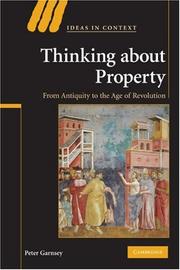
ISBN: 9780521700238 9780521876773 052170023X 052187677X 9780511482786 9780511379017 0511379013 9780511376313 0511376316 0511482787 110718276X 128124354X 9786611243548 0511378122 0511377258 0511374771 Year: 2007 Volume: 90 Publisher: Cambridge : Cambridge University Press,
Abstract | Keywords | Export | Availability | Bookmark
 Loading...
Loading...Choose an application
- Reference Manager
- EndNote
- RefWorks (Direct export to RefWorks)
This book explores ancient 'foundational' texts relating to property and their reception by later thinkers in their various contexts up to the early nineteenth century. The texts include Plato's vision of an ideal polity in the Republic, Jesus' teachings on renunciation and poverty, and Golden Age narratives and other evolutionary accounts of the transition of mankind from primeval communality to regimes of ownership. The issue of the legitimacy of private ownership exercises the minds of the major political thinkers as well as theologians and jurists throughout the ages. The book gives full consideration to the historical development of Rights Theory, with special reference to the right to property. It ends with a comparative study of the Declarations of Rights in the American and French Revolutions and seeks to explain, with reference to contemporary documents, why the French recognised an inalienable, human right to property whereas the Americans did not.
Right of property --- Property --- Personal property. --- Personal property --- Droit de propriété --- Propriété --- Propriété mobilière --- History. --- Philosophy --- Religious aspects. --- Moral and ethical aspects. --- Histoire --- Philosophie --- Aspect religieux --- Aspect moral --- History --- Religious aspects --- Moral and ethical aspects --- Droit de propriété --- Propriété --- Propriété mobilière --- Ownership of property --- Private ownership of property, Right of --- Private property, Right of --- Property, Right of --- Property rights --- Right of private ownership of property --- Right of private property --- Right to property --- Chattels --- Choses --- Personalty --- Property, Personal --- Philosophy&delete& --- Law and legislation --- Moral and religious aspects --- Civil rights --- Economics --- Possession (Law) --- Things (Law) --- Wealth --- Primitive property --- Arts and Humanities --- Right of property - History --- Property - Philosophy - History --- Property - Religious aspects --- Personal property - Moral and ethical aspects
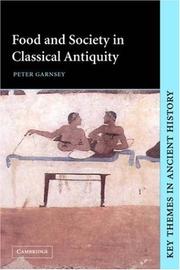
ISBN: 9780521645881 0521645883 0521641829 9780521641821 9780511612534 051117330X 0511066228 0511059914 0511324960 0511612532 1280420421 1139145967 0511068352 1107116260 9780511066221 9780511068355 9780511059919 6610420424 9786610420421 9781280420429 9781139145961 9780511173301 9780511324963 9781107116269 Year: 1999 Publisher: Cambridge, U.K. ; New York : Cambridge University Press,
Abstract | Keywords | Export | Availability | Bookmark
 Loading...
Loading...Choose an application
- Reference Manager
- EndNote
- RefWorks (Direct export to RefWorks)
This is the first study of food in classical antiquity that treats it as both a biological and a cultural phenomenon. The variables of food quantity, quality and availability, and the impact of disease, are evaluated and a judgement reached which inclines to pessimism. Food is also a symbol, evoking other basic human needs and desires, especially sex, and performing social and cultural roles which can be either integrative or divisive. The book explores food taboos in Greek, Roman, and Jewish society, and food-allocation within the family, as well as more familiar cultural and economic polarities which are highlighted by food and eating. The author draws on a wide range of evidence new and old, from written sources to human skeletal remains, and uses both comparative historical evidence from early modern and contemporary developing societies and the anthropological literature, to create a case-study of food in antiquity.
Civilization, Classical --- Food habits --- Food supply --- 394.12093 --- Food control --- Produce trade --- Agriculture --- Food security --- Single cell proteins --- Eating --- Food customs --- Foodways --- Human beings --- Habit --- Manners and customs --- Diet --- Nutrition --- Oral habits --- Classical civilization --- Civilization, Ancient --- Classicism --- History --- Social sciences Food Ancient World --- Arts and Humanities --- Civilization, Classical. --- Habitudes alimentaires --- Aliments --- Civilisation ancienne --- History. --- Histoire --- Approvisionnement --- Greece --- Rome --- Civilization [Classical ] --- Food habits - Greece - History - To 1500 --- Food habits - Rome --- Food supply - Greece - History - To 1500 --- Food supply - Rome
Book
ISBN: 1913701123 Year: 2020 Publisher: London : Cambridge Philological Society,
Abstract | Keywords | Export | Availability | Bookmark
 Loading...
Loading...Choose an application
- Reference Manager
- EndNote
- RefWorks (Direct export to RefWorks)
Classical antiquities. --- Working class --- Agricultural laborers
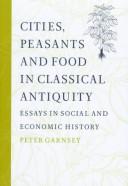
ISBN: 0521591473 0521892902 051158539X 0511005164 9780511005169 9780511585395 Year: 1998 Publisher: Cambridge : Cambridge University Press,
Abstract | Keywords | Export | Availability | Bookmark
 Loading...
Loading...Choose an application
- Reference Manager
- EndNote
- RefWorks (Direct export to RefWorks)
Sixteen essays in the social and economic history of the ancient world, by a leading historian of classical antiquity, are here brought conveniently together. Three overlapping parts deal with the urban economy and society, peasants and the rural economy, and food-supply and food-crisis. While focusing on eleven centuries of antiquity from archaic Greece to late imperial Rome, the essays include theoretical and comparative analyses of food-crisis and pastoralism, and an interdisciplinary study of the health status of the people of Rome using physical anthropology and nutritional science. A variety of subjects are treated, from the misconduct of a builders' association in late antique Sardis, to a survey of the cultural associations and physiological effects of the broad bean.
Cities and towns --- Cities and towns, Ancient --- Food supply --- Peasants --- History --- -Food supply --- -Peasantry --- Agricultural laborers --- Rural population --- Marks (Medieval land tenure) --- Villeinage --- Food control --- Produce trade --- Agriculture --- Food security --- Single cell proteins --- Geography, Ancient --- Peasantry --- Arts and Humanities
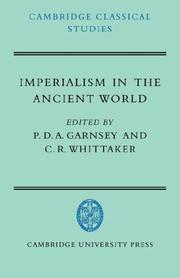
ISBN: 1139881515 1107712602 1107297931 1107719976 1107715849 1107714524 9781107719972 9781107297937 9781107714526 0521218829 9780521218825 9780521033909 052103390X Year: 1978 Publisher: Cambridge : Cambridge University Press,
Abstract | Keywords | Export | Availability | Bookmark
 Loading...
Loading...Choose an application
- Reference Manager
- EndNote
- RefWorks (Direct export to RefWorks)
The economics of imperialism, its political background and institutional frameworks, the material benefits it conferred, the ideologies of ruler and ruled - these are some of the more important aspects of imperialism discussed in this volume. In presenting the evidence for ancient imperialims and suggesting concepts and methods of interpretation these articles, which are the work of the Cambridge University Research Seminar in Ancient History, range from New Kingdom Egypt and Carthage, through the classical Greek world of Athens and Sparta, to Macedonia and Rome. This book will be particularly useful to ancient historians but should also interest historian of other periods as well as students of politics.
History, Ancient. --- Imperialism. --- Colonialism --- Empires --- Expansion (United States politics) --- Neocolonialism --- Political science --- Anti-imperialist movements --- Caesarism --- Chauvinism and jingoism --- Militarism --- Ancient history --- Ancient world history --- World history --- History, Ancient --- Imperialism --- Histoire ancienne --- Impérialisme --- History --- Histoire --- Addresses, essays, lectures.
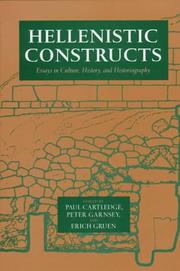
ISBN: 0520918339 058516021X 9780520918337 9780585160214 0520206762 Year: 1997 Publisher: Berkeley, California : University of California Press,
Abstract | Keywords | Export | Availability | Bookmark
 Loading...
Loading...Choose an application
- Reference Manager
- EndNote
- RefWorks (Direct export to RefWorks)
The Hellenistic period (approximately the last three centuries B.C.), with its cultural complexities and enduring legacies, retains a lasting fascination today. Reflecting the vigor and productivity of scholarship directed at this period in the past decade, this collection of original essays is a wide-ranging exploration of current discoveries and questions. The twelve essays emphasize the cultural interaction of Greek and non-Greek societies in the Hellenistic period, in contrast to more conventional focuses on politics, society, or economy. The result of original research by some of the leading scholars in Hellenistic history and culture, this volume is an exemplary illustration of the cultural richness of this period. Paul Cartledge's introduction contains an illuminating introductory overview of current trends in Hellenistic scholarship. The essays themselves range over broad questions of comparative historiography, literature, religion, and the roles of Athens, Rome, and the Jews within the context of the Hellenistic world. The volume is dedicated to Frank Walbank and includes an updated bibliography of his work which has been essential to our understanding of the Hellenistic period.
Hellenism. --- Hellenism --- Greece --- Regions & Countries - Europe --- History & Archaeology --- Mediterranean Region --- Civilization. --- ancient greece. --- ancient history. --- ancient literature. --- asia history culture. --- athens. --- complex culture. --- culture ancient near east. --- essay collection. --- fascinating time period. --- greek societies. --- hellenistic history. --- hellenistic period. --- hellenistic scholarship. --- jewish history. --- judaism. --- rich culture. --- rome. --- sociology of the ancient world. --- world history.
| Listing 1 - 6 of 6 |
Sort by
|

 Search
Search Feedback
Feedback About UniCat
About UniCat  Help
Help News
News